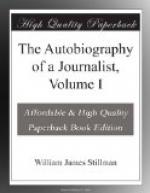A little later, and while at work in my father’s shop, there came in for a piece of ironwork our local artist, a man of curious artistic faculties, a shoemaker by trade, who had taught himself painting and had made himself a certain position as the portrait painter of the region. He desired to make for himself a lay-figure, and for the articulations had conceived a new form of universal joint, which he desired my father to put into shape. My father refused the job, as out of the line of his work, and I volunteered to take it, stipulating for some instruction in painting in return. The joint did not answer when worked out, but the friendship between Sexton and myself lasted through his life, and a truer example of the artistic nature never came under my study. All that he knew of painting he got from books, save for an annual visit to the exhibition of the American Academy at New York, but his conception of the nature of art was very lofty and correct, and had his education been in keeping with his natural gifts, he would have taken a high position as a painter. His was one of the most pathetic lives I can recall—a fine sensitive nature, full of the enthusiasms of the outer world, with rare gifts in the embryonic state and mental powers far above the average, limited in every direction, in facilities, in education in art and in letters, and having his lot cast in a community where, except the wife of President Nott, there was not a single person who was capable of giving him sympathy or artistic appreciation. Not least in the pathos of his situation was the simplicity and humility with which he accepted himself, with his whole nature yearning towards an ideal which he knew to be as unattainable as the stars, without impatience or bitterness towards men or fate. If he was not content with what was given him, no one could see it, and he was so filled with the happiness that nature and his limited art gave him that he had no room for discontent at the limitations.
Happy days were those in which my leisure gave me the opportunity to share this man’s walks and make my crude sketches of his favorite nooks and bends of our beautiful river Mohawk, and listen to his experiences while he worked. I can see now that it was more nature than art that evoked my enthusiasms, and that in art I felt mainly the expression of the love of the beauty of nature. Sexton gave me some idea of the use of oils, and from that time most of my leisure hours and my vacant days were given to painting in an otherwise untaught manner, copying such pictures as I could borrow, or translating engravings into color—wretched things most certainly, but to me then, with my crude enthusiasm, productive of greater pleasure than the better productions of later years.




